Unlock your genetic potential or gift the power of personalized health. Browse our Supersaver Packs now.
If you’ll believe it, one simple fruit could add a refreshing flavor to your tea and potentially transform your health! Bergamot, a citrus fruit, has quietly earned its place in the world of natural remedies. Its traditional roots and enviable nutrition profile make it an excellent candidate for cholesterol management. But what makes this fruit so unique? Can it seamlessly integrate into modern wellness? Let’s uncover the exceptional properties of this fruit and learn whether you should try bergamot for cholesterol management.
Bergamot, also called Citrus bergamia, is a citrus fruit with a yellow color and a size similar to an orange.
The name "bergamot" is believed to have originated from the Italian city of Bergamo, where the fruit was first commercially traded.
Traditional Italian medicine has utilized bergamot peel and its juice for centuries, valued for their healing properties.
The fruit is also famous for adding its distinctive flavor to Earl Grey tea.
Bergamot is rich in natural compounds such as flavonoids and phytochemicals and is believed to offer a range of health benefits.
It’s commonly available as supplements, essential oils, juices, and extracts.
Additionally, its calming aroma is often enjoyed through inhalable sticks designed for therapeutic purposes.
This fruit is valued for its uses in health, aromatherapy, and even tea-making.
Bergamot's precise source remains debatable, but its cultivation is concentrated in several key regions.
Bergamot is rich in polyphenols, a diverse group of natural compounds vital in regulating fat and sugar metabolism.
These include various flavonoids, such as
and flavones, such as
They lower total cholesterol, triglycerides, and LDL ("bad") cholesterol while improving insulin sensitivity and regulating communication between fat tissue and the body.
When combined with pectins and vitamin C in supplements, bergamot polyphenols enhance the production of adiponectin, a hormone that regulates metabolism.
They also help balance the appetite hormones leptin and ghrelin.
This process aligns with the lipostat theory, which proposes a system for maintaining body fat levels.
Bergamot polyphenols have a dose-dependent effect, meaning their impact increases with the amount consumed.
They also work with statins (cholesterol-lowering medications), helping improve the lipid profile and support cardiovascular health.
Bergamot holds significant potential for improving overall health, impacting the body and mind. Here are a few of its key benefits:
Bergamot may help lower cholesterol levels based on several studies.
In a 2018 study, researchers looked at how bergamot extracts affected people with high cholesterol and other related health issues. They divided the participants into three groups: one received a placebo (no active ingredient), one received a standard bergamot extract (BPF), and the last group received a special form of the extract (BPF Phyto).
Here’s what they found:
The placebo group did not show any changes.
Both forms of bergamot were effective in lowering cholesterol and blood sugar levels within just 30 days, and there was no significant difference between the two types of extracts in how well they worked.
In summary, bergamot appears to be beneficial for managing cholesterol levels and improving overall health.
A review of 12 studies found that bergamot supplementation contributed to significant reductions in cholesterol levels:
These outcomes from the studies highlight bergamot’s potential to reduce cholesterol and triglycerides across various lipid categories.
Bergamot supplementation has been shown to lower cholesterol levels, with clinical trials observing reductions throughout 1 to 6 months of consistent use.
While some individuals may experience changes within several weeks, the exact timeframe can vary.
This variation depends on factors such as overall health, initial cholesterol levels, and adherence to the recommended dosage.
There's no single "best" form of bergamot for cholesterol reduction.
Various forms have been studied, including bergamot fruit extracts (widely used in research), standardized supplements with specific bergamot polyphenols, and juice.
While each has shown potential in clinical trials, further comparative studies could help verify these promising claims.
The dosage of bergamot for managing cholesterol can vary based on the form (extract, oil, or supplement), concentration, and individual health.
Studies suggest that daily doses of bergamot extract generally fall between 150 mg and 1500 mg.
Bergamot is typically safe, but one should be cautious of its possible side effects, especially when consumed in large amounts or misused.
Here are some potential side effects:
It’s best to avoid bergamot for cholesterol management if you fall into these categories:
No, bergamot is not hard on the liver when used correctly. A randomized controlled trial showed that people taking a supplement with bergamot had a 48.2% reduction in liver fat compared to 26.9% in the placebo group.
These results suggest that bergamot can improve liver health when used in the right amounts.
Bergamot has shown potential kidney-protective effects in studies.
Bergamot juice helped reduce malondialdehyde (MDA) levels in rats on a high-fat diet, indicating a decrease in oxidative stress.
Kidney tissue examination also suggested that bergamot juice prevented kidney damage caused by high cholesterol.
However, more research is needed to understand its effects on human kidneys fully.
Bergamot can be a versatile addition to your diet, bringing flavor and potential health benefits.
Below are practical ways to include it in your meals:
Consult a medical professional before starting, stopping, or continuing a supplement regimen.
Adults may take bergamot extract in doses of up to 1000 mg daily for 4 to 12 weeks.
Consult a healthcare professional regarding the ideal dosage for your specific condition.
Depending on your preference and body response, you can take bergamot in the morning or night.
Some find it helps promote calmness during the day, while others prefer it at night for its relaxing properties.
Observe how it affects you and choose the time that best suits your needs.
Earl Grey tea contains bergamot, but whether the concentration can influence cholesterol levels is unclear.
Bergamot and black tea might aid digestion and help lower blood pressure and cholesterol, which benefits heart health.
However, further studies are required to confirm the impact of bergamot in Earl Grey.
Managing cholesterol naturally often involves a combination of strategies. Here are some key lifestyle and dietary changes to consider:
Bergamot has shown some cholesterol-lowering effects, but it works differently from statins.
While statins reduce cholesterol by inhibiting the HMGCR enzyme, bergamot does not directly affect this enzyme.
Instead, it may lower cholesterol by affecting cholesterol synthesis and absorption.
Although bergamot shows potential, it should not replace statins, especially for individuals who need strong cholesterol management.
Always consult a healthcare provider before considering bergamot as an alternative to statins.
It's difficult to definitively say which is the best because "best" depends on individual needs and circumstances.
Many natural supplements are available that may help lower cholesterol, but their effectiveness and potential side effects vary.
Discuss any new supplement with your physician before use, especially if you have underlying health problems or are taking other medications.
Both berberine and bergamot are great for cholesterol management, but bergamot is especially effective at lowering LDL and improving HDL for better overall cholesterol levels.
It is an excellent choice if your main focus is improving your cholesterol profile.
Berberine also helps with cholesterol and is especially good for your gut and digestion. It aids in keeping gut bacteria balanced and promotes better digestion.
Berberine is also known for its ability to control blood sugar, making it ideal for supporting both blood sugar and digestive health.

Fluctuating Cholesterol Levels And Alzheimer's Risk - The ApoE Connection

Lima Beans: Nutrition Facts, Health Benefits, Side Effects, & More
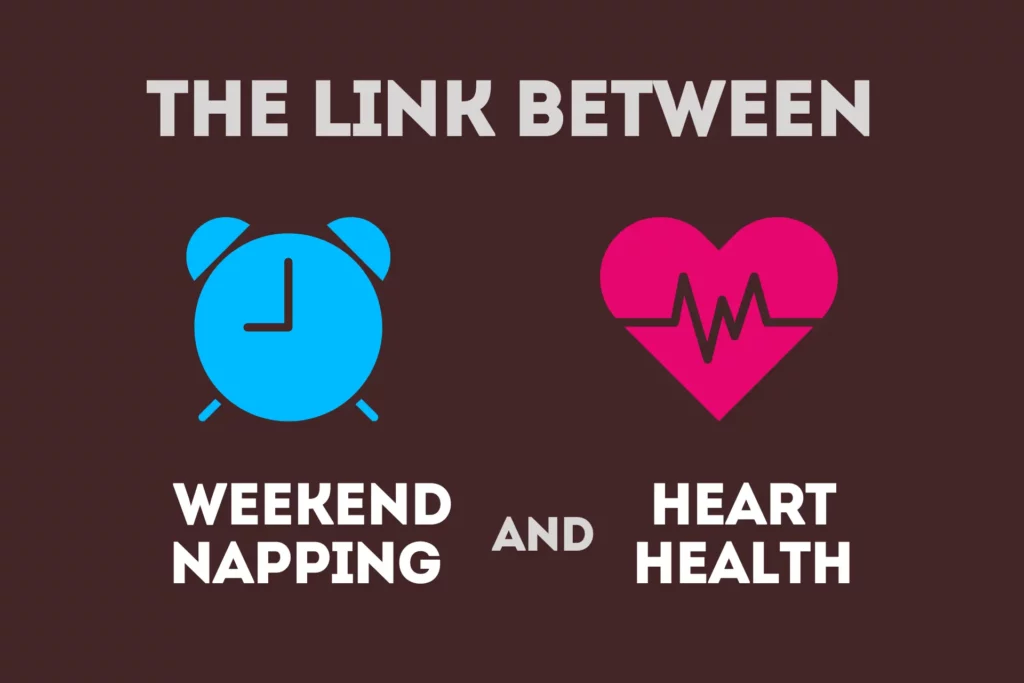
Can Weekend Naps Improve Your Heart Health?
https://www.medicalnewstoday.com/articles/bergamot-supplement-benefits
https://www.health.com/health-benefits-of-earl-grey-8598609
https://www.mdpi.com/2673-8392/1/1/16
https://pmc.ncbi.nlm.nih.gov/articles/PMC8569986
https://pubmed.ncbi.nlm.nih.gov/10940328
https://www.nhs.uk/conditions/statins
https://pmc.ncbi.nlm.nih.gov/articles/PMC6392855
https://pubmed.ncbi.nlm.nih.gov/28591067
https://www.mayoclinic.org/diseases-conditions/schizophrenia/symptoms-causes/syc-20354443
https://pubmed.ncbi.nlm.nih.gov/32379683
https://pmc.ncbi.nlm.nih.gov/articles/PMC6497409
https://www.tandfonline.com/doi/full/10.1080/10408398.2019.1677554
https://www.healthline.com/health/cholesterol/can-bergamot-lower-cholesterol
https://www.sciencedirect.com/topics/medicine-and-dentistry/furocoumarin
https://www.medicalnewstoday.com/articles/325113
https://www.medicalnewstoday.com/articles/brisk-walking
https://pmc.ncbi.nlm.nih.gov/articles/PMC8469228
https://pmc.ncbi.nlm.nih.gov/articles/PMC7431622
https://www.health.com/condition/cholesterol/cholesterol-lowering-supplements-what-works-what-doesnt
https://pubmed.ncbi.nlm.nih.gov/19655295
https://www.sciencedirect.com/topics/medicine-and-dentistry/malonaldehyde
https://www.webmd.com/vitamins/ai/ingredientmono-142/bergamot
https://botanicalinstitute.org/citrus-bergamot-vs-berberine
As someone who can devour a plate of buffalo wings without breaking a sweat, I often find myself puzzled by my friends' reactions to spicy food. While I enjoy the spicy kick, they’re left gasping for water, tears streaming down their faces. This stark contrast sparked my curiosity about what really determines our spice tolerance. After diving into some fascinating research, I discovered that our ability to handle heat isn’t just about taste preferences—it has a significant genetic component!
The taste buds present on our tongue can taste salty, sweet, or sour foods.
However, there are no receptors to taste spicy food.
Therefore, the heat you feel from spicy food is a pain sensation.
Chilli peppers have a component called Capsaicin that makes them hot and spicy.
This component binds with a receptor called TRPV1 on the tongue, giving a heat sensation.
This receptor is involved in regulating your body temperature.
Repeated exposure can gradually make this receptor less sensitive.
Spice tolerance has a lot to do with genes.
In fact, a study has reported that up to 58% of differences in spice tolerance among individuals can be attributed to genetics.
While there may not be a single gene contributing to spice tolerance, it is hypothesized that people with higher tolerance have fewer TRPV1 receptors on the tongue.
This means that they may be less sensitive to the burning and painful feeling of spice and can thus enjoy it more.
However, the good news is that spice tolerance is something that can be built with repeated exposure.
When you consume spicy foods regularly, you desensitize the receptors which will allow you to enjoy them without the burning sensation.
Spice tolerance might have a surprising connection with personality.
People who are thrill seekers and are more adventurous might like spicy food.
People who take more risks and enjoy otherwise scary situations like an extreme roller coaster ride might like spicy food.
People who love spicy food and don't find it painful have fewer Capsaicin receptors.
It is not that they cannot taste the spiciness altogether, but they feel less pain and heat.
Over time, eating spicy food can desensitize nerve endings, resulting in a higher spice tolerance.
People from Mexico, Korea, or India are naturally more tolerant of spicy food because they consume them regularly.
They have become desensitized to the pain from a young age.
Building your spice tolerance is not only possible but can also be an enjoyable journey! Here are some effective strategies to help you gradually increase your ability to handle spicy foods:
Begin by incorporating small amounts of spicy ingredients into your meals.
This could be as simple as adding a pinch of chili flakes to your pizza or a dash of hot sauce to your soup.
The key is to start with a level of spiciness that is manageable for you and slowly increase it over time.
Regularly consuming spicy foods can help desensitize your TRPV1 receptors.
The more frequently you expose your taste buds to spice, the more accustomed they will become.
Over time, this repeated exposure can lead to a higher tolerance, allowing you to enjoy spicier dishes without discomfort.
Combining spicy elements with familiar flavors can make the transition easier.
For instance, try mixing spicy salsa with guacamole or adding chili powder to a dish you already love.
This way, you can enjoy the flavor of spice without overwhelming your palate.
Not all spicy foods are created equal.
Some spices provide heat without intense burning sensations.
For example, try milder peppers like poblano or Anaheim before tackling hotter varieties like jalapeños or habaneros.
This variety can help you find a comfortable entry point into the world of spice.
When consuming spicy foods, have dairy products like yogurt or milk on hand (not recommended if you are lactose intolerant).
Dairy contains casein, which binds to capsaicin and helps neutralize its effects.
Staying hydrated is also essential, as it can alleviate some of the discomfort associated with eating spicy foods.
According to a recent report by Technomic, Asians appear to have the highest spice tolerance, while Caucasians, have the least.
It is a mix of both nature and nurture. Some may be born with fewer spice receptors in their tongue, which makes them less sensitive to the burning sensation of spice. Repeated exposure to spice right from a young age can also build up spice tolerance.
A 2014 study revealed that higher salivary testosterone levels were associated with higher consumption of hot sauce and lower self-reported perception of spiciness. However, more research needs to be done to check if this theory has any merit.
Spice tolerance is mainly genetic.
Capsaicin, the spice component found in chili peppers, can elicit pain when binding to the TRPV1 receptors.
People who have fewer TRPV1 receptors are less sensitive to spicy food.
Spice tolerance also has a lot to do with someone's personality.
Spice tolerance can be gradually built by eating small amounts of spicy foods over time.
http://www.sciencedirect.com/science/article/pii/S0031938412003095

How Genes Influences The Tendency To Prefer Bitter Foods?

How Nutrigenomics is Changing the Way We Think About Food
The MAO-A gene, popularly nicknamed the “warrior gene,” produces the enzyme monoamine oxidase A (MAOA). It breaks down monoamine neurotransmitters (dopamine, epinephrine, and serotonin) through oxidation. Thus, mutations in the MAO-A gene can directly affect the levels of these neurotransmitters, potentially leading to various behavior-associated disorders. How much influence does this gene have on your personality?
MAO-A is an essential regulator of brain function and is highly expressed in the brain and heart cells. It mainly assists in the breakdown of neurotransmitters such as
Because MAO-A regulates the level of these “behavioral hormones,” too little or too much of this enzyme plays a role in several psychiatric and neurological disorders like schizophrenia and ADHD.
A class of drugs that inhibit this enzyme (MAOA inhibitors) is prescribed to treat depression.
We all have the MAO-A gene but carry different versions (or types or variants) of it.
Based on the number of times the sequence of the gene is repeated, there are two types of MAO-A genes: a high-activity (MAOA-H) and a low-activity (MAOA-L) type.
One of the most frequently studied variants is MAOA-4R, which has four repeats associated with high MAO-A enzyme activity.
Other forms of MAO-A include the 2-repeat (2R) and 3-repeat (3R) versions.
Monoamine oxidase A deficiency follows an X-linked inheritance pattern, primarily affecting males.
Lower levels of MAO-A typically result in the buildup of neurotransmitters in the brain.
This buildup manifests as unusual behavioral patterns involving aggressive outbursts and abnormal sexual behavior.
A deficiency of MAO-A has also been associated with abnormal brain development, which can directly lead to intellectual disabilities.
Lower levels of the enzyme result in a slower breakdown of the neurotransmitters, while higher levels of the enzyme equal a faster breakdown.
Lower and higher enzyme levels are popularly associated with ‘worrier’ and ‘warrior’ personalities, respectively.
Such differences happen through mutations at specific points in the gene sequence, known as RSIDs.
At a specific point, the sequence’s usual allele may be A, and this state of the sequence may be associated with some amount of risk for a given trait.
If a mutation occurs, and the allele at that point is now C, this state of the sequence may be associated with a higher or lower risk for that trait.
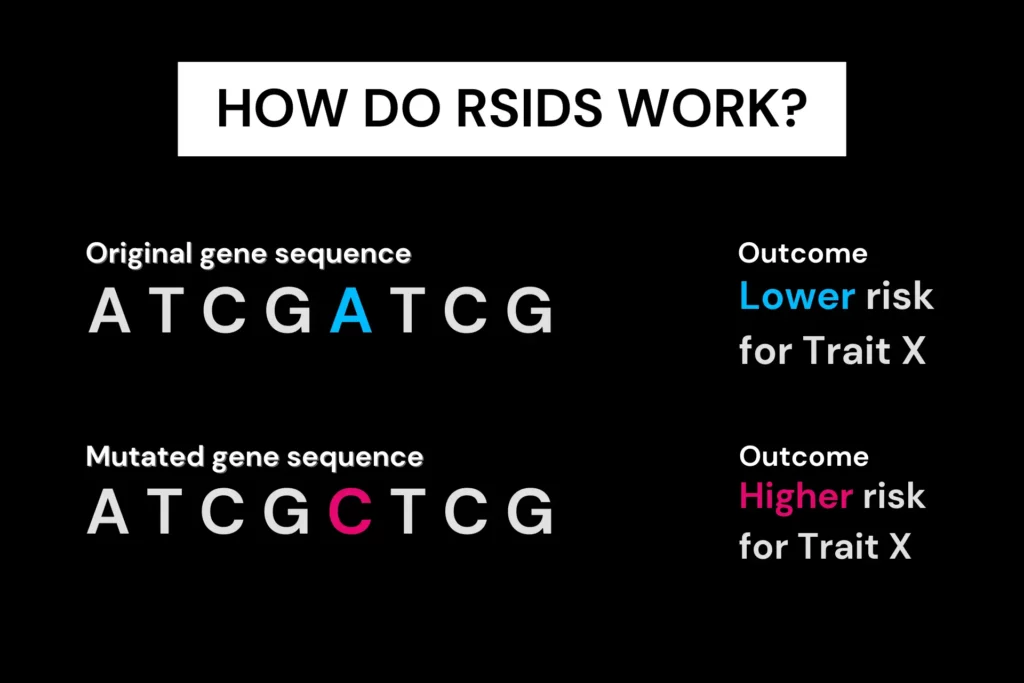
A study on around 18,000 people with psychiatric issues identified an SNP rs1137070 associated with major depressive disorder and schizophrenia.
People with the T allele had higher enzyme levels and, as a result, lower levels of the neurotransmitters.
Another study found that the G allele of rs6323 had the highest expression of the MAOA enzyme.
Subjects with major depressive disorder had the highest activity form of the enzyme (G or G/G).
A study identified an SNP rs3027407 on the MAO-A gene associated with ADHD.
This SNP affects dopamine-mediating action, which is related to the symptoms of ADHD in children. The A allele is more frequent in people with ADHD.
The T allele of rs909525 in the MAO-A gene is associated with less aggressive behavior due to the higher activity of MAOA - the warriors.
The C allele is associated with more aggressive behavior.
A variation in the MAO-A gene was associated with higher levels of anger being expressed. The A allele of rs2064070 was also associated with increased anger expression.
This study also confirmed that mutations in rs909525 and rs6323 have links to increased anger expression, as mentioned previously.
| RSID (variation) | Expressed allele | Likely outcome |
| rs1137070 | T | Lower neurotransmitter levels |
| rs6323 | G | Poor temper, risk of depressive disorders |
| rs3027407 | A | Increased risk for ADHD |
| rs909525 | T | Less aggressive behavior |
| rs909525 | C | More aggressive behavior |
| rs2064070 | A | Increased anger expression |
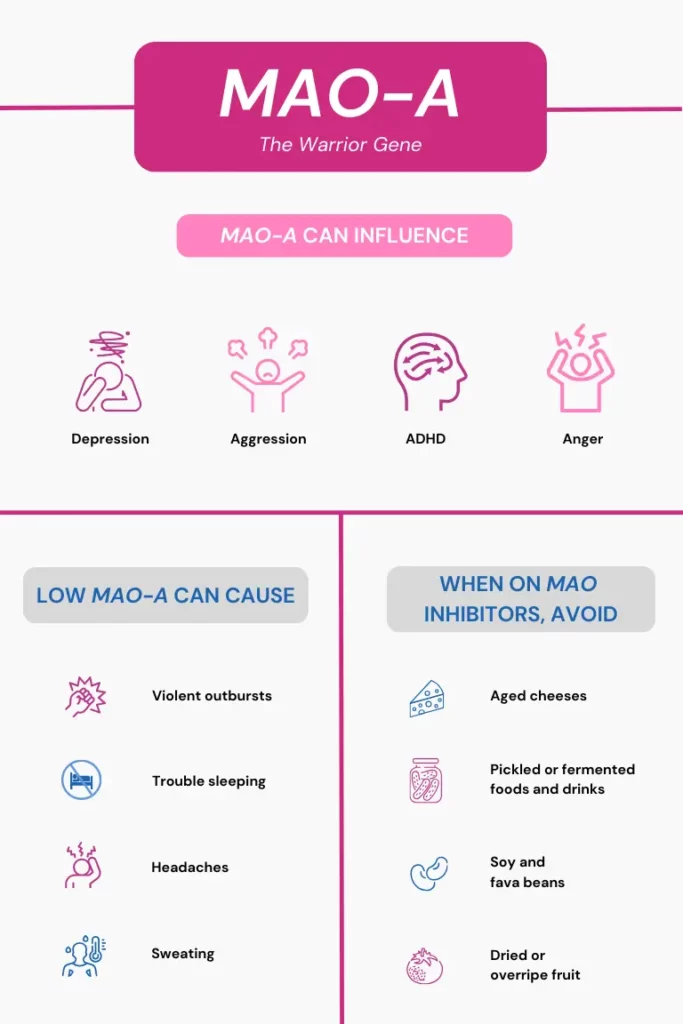
While the MAO-A gene helps regulate your neurotransmitters (thereby affecting your mood), the relationship between genes and your behavior isn’t entirely straightforward.
The COMT gene also helps regulate dopamine levels, contributing to your ‘warrior/worrier’ personality.
Mutations in the COMT gene also influence your creativity and impulsivity levels.
Xcode Life’s Traits And Personality Report studies the COMT variations you carry, revealing more information on the genetic aspects of your personality.
It also provides genetic results for the Big 5 traits, leadership, empathy, cognition, and more.
A study found that a poor-quality diet during adolescence can affect the verbal ability of individuals with a low expression variant of the MAO-A gene.
People who rarely ate vegetables and consumed more junk food had verbal deficits in early adulthood.
The “psychopathic” personality traits were also observed more in subjects who frequently consumed fast foods during their adolescence - this was seen only in people with a low expression variant of the MAO-A gene.
MAOA inhibitors (MAOA-I) are a class of drugs that lower the enzyme MAOA levels. Higher MAOA levels have been linked to conditions like depression.
When on MAOA-I, it is crucial to limit high-tyramine foods. Tyramine is an amino acid that helps regulate blood pressure. MAOA enzyme is required to break down tyramine, the buildup of which is associated with migraines and life-threatening blood pressure spikes.
If you are on MAOA-I, it is vital that you reduce your tyramine consumption.
Some foods high in tyramine are:
Everyone carries the MAO-A gene.
What differs among a population is the allele that is expressed, leading to either a ‘warrior’ or a ‘worrier’ personality.
The exact mechanism behind personality is more complex, but it’s essential to understand that everyone has the MAO-A gene and expresses it differently.
While the SNPs linked to MAO-A have links to increased aggression and anger expression, the link between genes and personality is far too complex.
Lesser MAO-A does affect how your neurotransmitters function, but other factors, like your immediate environment and circumstances, also affect your overall aggression levels.
MAO-A is an X-linked gene, and men only have one X chromosome.
Together, this means that the presence of one copy of MAO-A leads to its complete expression in men.
What differs is the level of its expression.

What Is COMT Gene Mutation?

How To Deal With A Slow COMT Gene

Which Parent Carries The Autism Gene?
For a long time, the only treatment for tooth decay was an extraction. Drilling out the decayed part and filling it with a filling material was another possible treatment option. A root canal treatment (RCT) is one of the most popular treatments for tooth decay since this procedure can save your tooth. However, did you know you can naturally reverse tooth decay without getting it filled or an RCT? In this article, we tell you why it might be possible and how you can do it.
Tooth decays are some of the most common dental problems in children and adults.
Food debris clings to your teeth when you don't rinse or brush your teeth after a meal.
Bacteria present in your mouth feed on these food debris and produce acids.
These acids erode the enamel, the outermost layer of your teeth, and result in tooth decay.
Here is an overview of the stages of tooth decay:
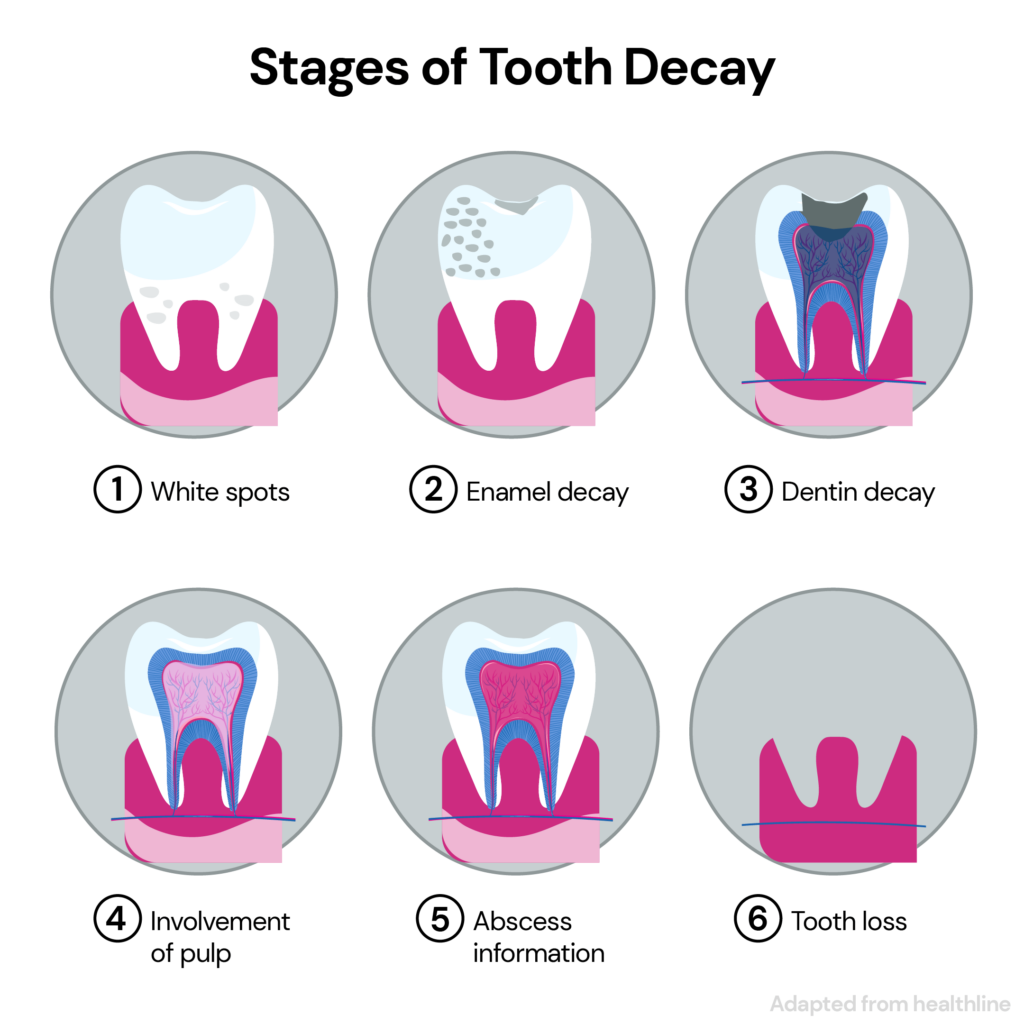
Oral hygiene habits and several medical conditions can lead to tooth decay.
Here are a few causes of tooth decay:
In the initial stages, you will not notice any symptoms of tooth decay.
However, as the decay progresses and reaches deeper layers of your teeth, you will start to notice symptoms.
If you catch tooth decay early enough, it is possible to reverse it.
Using fluoride gels on the affected area and maintaining a proper oral hygiene routine can reverse early-stage cavities.
Here are the top 3 at-home methods to reverse early-stage tooth decay:
One of the most common treatment options for tooth decay is to have your dentist drill your teeth to remove the infected part. Then, the cavity will be filled with a tooth-colored filling material or silver amalgam to prevent the infection from spreading further.
If tooth decay has damaged the tooth structure, inlays and onlays can be used to repair it. An inlay will cover all the pits and fissures of the tooth being repaired, while an onlay will cover a larger area and involve all the tooth's cusps.
When tooth decay reaches the pulp, a root canal is recommended. Endodontists are dentists who specialize in this procedure. They remove the pulp from the infected tooth and fill it with gutta-percha, a root-filling material. The treated tooth is then covered with a crown.
If the decayed tooth has been damaged beyond repair, your dentist will recommend an extraction to remove the tooth from the socket. Your dentist will remove the infected tooth under local anesthesia during an extraction. You can get artificial teeth or implants to replace the tooth.
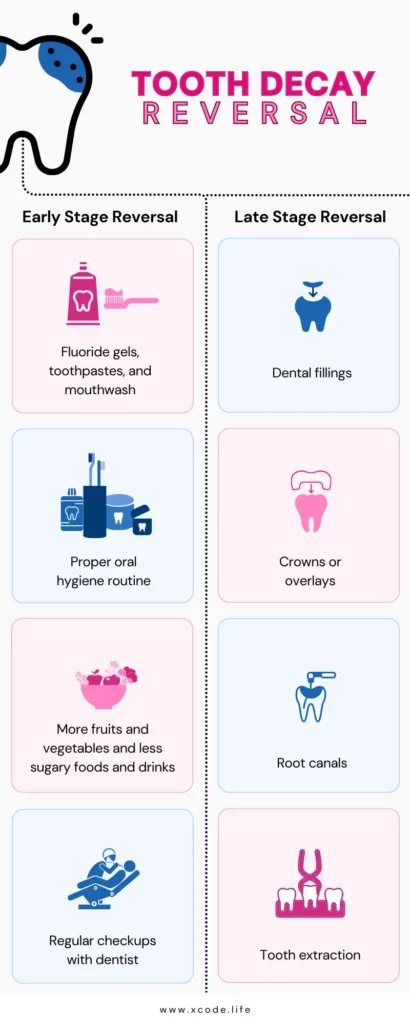
You can stop tooth decay before the demineralization process has started.
This means you can reverse tooth decay when it has only affected the surface levels of the enamel.
If you use fluoride toothpaste at this stage, you can remineralize the decayed area and prevent the infection from spreading further.
Once the tooth decay has reached the dentin and formed a hole in the teeth, it cannot be reversed anymore.
When the outer enamel layer gets destroyed, you have to visit a dentist to get it treated.
A good oral hygiene routine will help prevent tooth decay.
Here are a few important steps to maintain a proper oral hygiene routine:
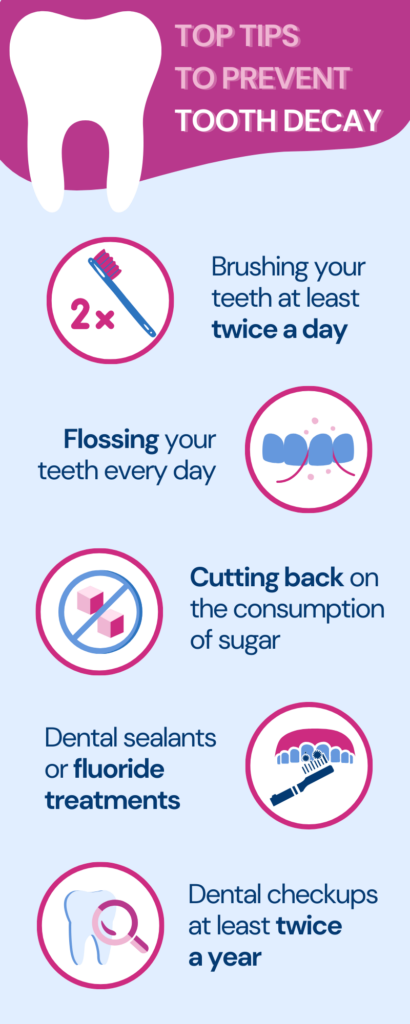
You should visit your dentist when you notice visible holes and spots on your tooth.
Chances are, you will also experience an accompanying toothache.
Other signs of tooth decay are:
Tooth decay is one of the world's most common oral health problems.
When caught early on, tooth decay can be reversed.
This can be done by remineralizing the area of the tooth destroyed by bacteria.
However, this will only be possible if the decay is superficial and hasn't yet reached the deeper layers of the tooth.
The best way to prevent tooth decay is to brush your teeth twice a day, floss before bed, and get checked by a dentist every six months.

Bad Teeth Genes: Can Dental Issues Run In Families?

Improve Your Dental Health For A Better Mental Health
https://www.nidcr.nih.gov/health-info/tooth-decay/more-info/tooth-decay-process
https://www.nidcr.nih.gov/health-info/tooth-decay
https://www.cdc.gov/nchs/fastats/dental.htm
https://pmc.ncbi.nlm.nih.gov/articles/PMC10799546
Muscle power and endurance are terms used while describing or setting up a workout routine. They sound interchangeable, but they’re different attributes of muscular health. Understanding these differences is an essential component of a healthy exercise routine. Not everyone needs the same workout, though. Some people naturally have better muscle power, and others have more endurance. Does genetics have something to do with it? Or is it just a matter of lifestyle and environment? Let’s find out!
According to the American Council on Exercise (ACE), muscle power is the ability to move weight quickly.
It can also be defined as the ability to exert maximum force in minimal time.
Muscle power requires fast-twitch muscles that contract quicker but tire sooner.
These muscles are used for sprinting, jumping, weight lifting, track and field, boxing, and football.
Muscle endurance is the ability to repeatedly perform one movement over a period of time.
According to the ACE, here are a few benefits of including muscle endurance training in your workout routine:
Consistency and stamina are two key characteristics of muscle endurance.
Slow-twitch muscle fibers contract slowly but can work for a long time without tiring.
These fibers enable endurance activities like marathon running and repetitive, rhythmic exercises like weighted squats.
| Muscle Power | Endurance | |
| Force vs. duration | It is the application of large forces in short duration | It is the application of low to moderate force sustained over a period of time |
| Muscle fiber type | Fast-twitch fibers (Type II) are predominant in power activities | Slow-twitch fibers (Type 1) are dominant in endurance activities |
| Energy system utilized | Since the movement required is quick, muscle power uses anaerobic energy systems like ATP-PC and the glycolysis pathway | Endurance requires sustained movements over a period of time; the muscles require oxygen and depend on aerobic energy systems |
| Genetics and muscle fiber composition | The 577RR variant of the ACE gene is associated with a high proportion of fast-twitch fibers and is seen more commonly in athletes who rely on muscle power. | The 577XX variant of the ACE gene is more common among high-performing endurance athletes. |
Athletic performance and training can be designed according to the individual’s muscle composition.
Let’s look at some aspects of training for muscle power and endurance.
Working out is one of the most effective ways to boost muscle power.
A few helpful exercises include:
To ensure your muscle power training is safe and effective, here are a few things to keep in mind:
These practices help keep both types of muscle fibers healthy, promoting overall muscle fitness while minimizing the risk of pain or injury.
Cardio is an effective way to improve muscular endurance and build your stamina.
It helps build the body’s lactic acid system, allowing it to sustain muscular contraction for longer.
A few examples of cardio activities that can help build muscular endurance include:
Muscular exercises that use body weight and target specific body muscles are another way to improve endurance.
A few examples of exercises that use body weight include:
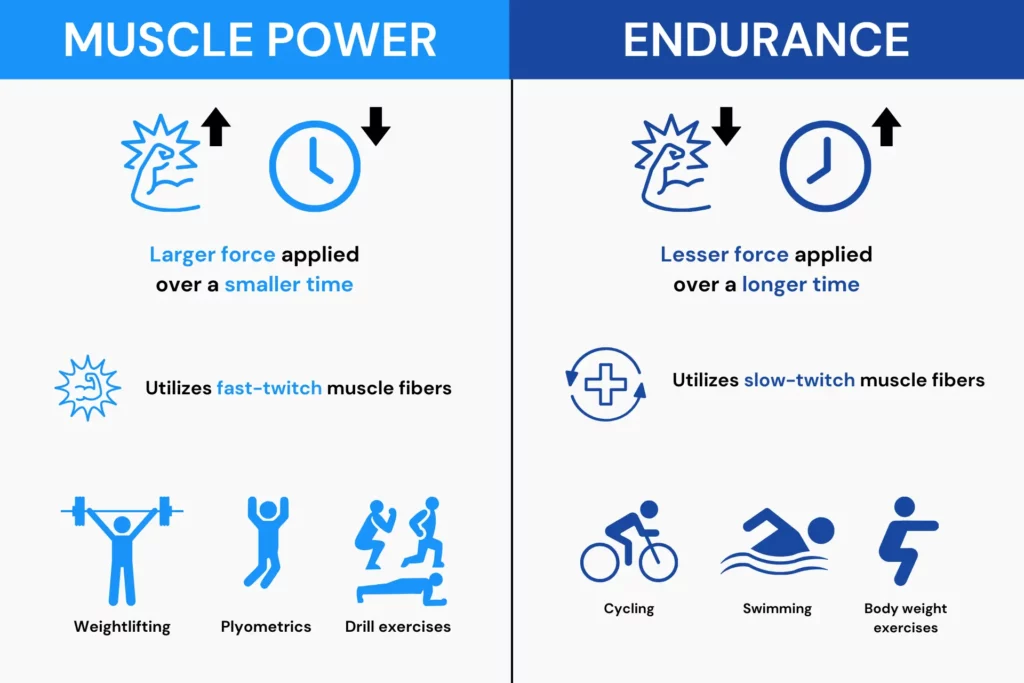
Though the muscular ability of individuals varies, balancing muscle power and endurance offers a well-rounded fitness journey.
It allows one to easily perform everyday activities, reduces the risk of injury, and optimizes athletic performance.
Muscle strength and endurance are both muscle abilities, and neither is better than the other.
However, depending on your fitness goals, one may be better suited for you than the other.
While muscle strength requires short, intense bursts of energy, endurance is recommended for activities needing sustained effort, such as distance running or swimming.
For overall fitness, a balance of both is recommended.
To boost muscle power and endurance, you must train for them together.
It’s best to achieve a balance between muscle power and endurance in your everyday life.
Powerlifting involves lifting a large weight once with an emphasis on speed and power.
Endurance lifting involves lifting lighter weights multiple times with an emphasis on rhythm and stamina.
Both these types of weight lifting are aimed at developing different muscular fibers and abilities.
Two tests are used for muscular power– the broad jump test and the vertical jump test.
This test is used to measure the muscular power of the legs.
Stand with your feet slightly apart, jump as far ahead as possible, land steadily on both feet, and measure the distance between where you started and where you landed.
The average of three attempts is a good indicator of your muscular power.
This is a common test used to measure the muscular power of an individual’s lower body, especially their ability to jump vertically.
Stand facing a wall or some vertical measuring device with your feet shoulder-width apart and hands on your hips. Jump straight up as high as possible, landing at the same spot you jumped from.
The average of three attempts is a good indicator of your lower body’s muscle power and performance in volleyball, basketball, and track and field.
Powerlifters target maximum strength and power at the expense of endurance.
On the other hand, bodybuilders train to gain muscle size and may have moderate endurance due to higher-rep training.
So, bodybuilders may have slightly better endurance while lifting weights due to their training style.
Powerlifters show better raw strength.
In addition to fitness training and diet, you can opt for supplements that may help with power and endurance build-up. These include:
Beetroot juice and iron-rich foods in your diet can also help with muscle power and endurance training.
Always consult a healthcare professional before starting a supplement regimen.

Is DOMS A Sign Of Muscle Growth?

What Vitamin Stops Age-Related Muscle Loss?

Reviewing The Most Popular Diets Of 2024
We often hear that acne is just a teenage problem that will fade away with adulthood. However, for many, acne remains a persistent issue well into their twenties and thirties. When dealing with acne, what you put on your plate matters as much as what you put on your face. While sugary and oily foods are known culprits, eggs have also come under scrutiny. Despite being a nutritional powerhouse, some worry that the hormones in eggs, such as albumin and progesterone, might trigger acne. In this article, we explore whether eggs can cause acne and how you can maintain healthy skin through smart dietary choices.
Eggs, in particular, have been under scrutiny.
Some sources suggest that eggs may contribute to acne due to the presence of hormones like progesterone and substances such as iodine, biotin, and albumin.
These components are known to be potential acne triggers for some individuals.
While eggs contain hormones that can influence sebum production, a key factor in acne development, the extent to which they affect individuals can vary greatly.
Some may find that consuming eggs worsens their acne, while others may not notice any change.
Eggs are a rich source of nutrients, providing high-quality protein, vitamins, and minerals. However, certain components within eggs have been identified as potential acne triggers:
Consuming egg whites, which contain the protein albumin, might trigger an inflammatory response in people with egg allergies or sensitivities. This response could potentially contribute to facial inflammation and acne.
Eggs contain small amounts of hormones like progesterone. While theoretically possible, these trace amounts are unlikely to significantly disrupt hormonal balance and lead to acne in most people.
Eggs contain iodine, but the amount is unlikely to be a significant factor for acne development in most individuals.
Eggs are rich in biotin, a vitamin B important for skin health. However, high biotin intake might interfere with the absorption of other B vitamins involved in oil regulation. This could contribute to acne in some cases, but more research is needed.
It's important to remember that these components don't necessarily cause acne in everyone. The impact of eggs on acne varies greatly between people. Factors like genetics, overall diet, and skin type play significant roles.
The science on eggs and acne isn't black and white, so neither whites nor yolks are a guaranteed culprit. Here's an analysis of the potential factors:
While eggs offer valuable protein and vitamins, certain components might worsen acne for those sensitive to particular ingredients.
Here's why eggs could be problematic for some:
It's crucial to note that scientific understanding in this area is still evolving, and the impact of diet on acne varies significantly among individuals.
The decision of whether or not to eliminate eggs from your diet should be taken only after consulting a qualified dermatologist.
Egg allergies can lead to various skin problems that can disrupt your daily routine. Here's how eggs can affect your skin health:
Did You Know? Certain genes can increase your risk for acne. They influence oil production and inflammatory response. Xcode's Gene Skin panel uncovers your risk for acne and provides comprehensive insights into overall skin health.
*reports are generated only using existing ancestry test DNA data. xcode does not ship out DNA kits
Recent research highlights the possibility of dietary factors influencing acne in some individuals, shedding light on potential triggers to be aware of:
Studies suggest a link between milk consumption, especially during teenage years, and worse acne. Milk might mess with hormones like insulin and IGF-1, worsening breakouts.
It's crucial to note that diets high in fast food, characterized by sugary, greasy, and processed foods, have been linked with increased acne. This type of eating can disrupt your body's hormones and genes, potentially causing breakouts.
Researchers have yet to answer whether chocolate directly causes acne. Some recent studies suggest a connection, but why and how strong it is remains a mystery.
Some worry that the amino acids in whey protein powders might make skin cells grow too fast and clog pores. Also, the effect of whey protein on hormones needs more investigation regarding acne.
Since acne involves inflammation, foods you're sensitive to might worsen breakouts. An elimination diet with a doctor's help can reveal your personal trigger foods.
Here are some approaches you can consider to potentially incorporate eggs into your diet while minimizing the risk of acne breakouts:
Here are 5 foods that may be beneficial for preventing acne:
Those prone to inflammatory responses and sensitive to hormonal changes may have a higher risk of developing acne due to the albumin and hormones present in eggs.
Eggs do have certain nutritional components like protein, B vitamins, and selenium, all of which benefit skin health. However, individual responses to eggs vary.
Many food and food groups can trigger acne. Some of them are: processed food, sugary foods, dairy, and alcohol.
Foods rich in omega-3 fats (like walnuts and salmon), antioxidants (like berries and greens), lean protein (like poultry and tofu), and low glycemic foods can help with acne.
Cottage cheese and other dairy products have been associated with acne. Although there's no direct link, it can aggravate acne and also may trigger acne in those who are predisposed to it.
While eggs are nutritious, some components, such as albumin, hormones, iodine, and biotin, may trigger acne in some people based on genetics, diet, and skin type.
Egg allergies can result in skin problems such as inflammation, hives, and aggravated eczema.
Dairy, fast food, chocolate, whey protein, and food sensitivities are other potential dietary acne triggers.
To reduce acne risk when consuming eggs, try moderate intake, alternative protein sources, healthy cooking methods, and a trial elimination/reintroduction process.
A diet rich in vegetables, fatty fish, fruits, zinc-rich foods, whole grains, and vitamin A vegetables can help reduce acne breakouts.
Consult a healthcare professional for persistent acne concerns and create a personalized plan that may include eggs.
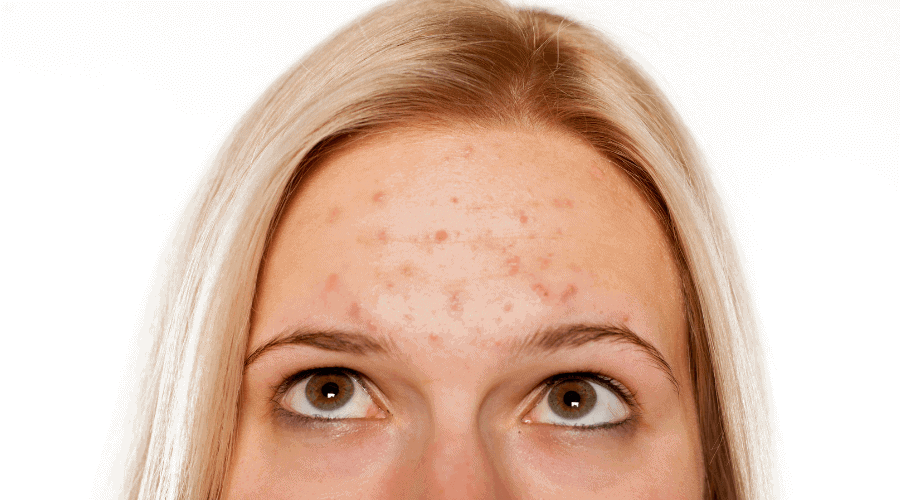
How Genes Influence Your Risk For Acne

How Does Genetics Influence Your Risk For Egg Allergy?
https://www.medicalnewstoday.com/articles/does-progesterone-cause-acne
https://www.medicalnewstoday.com/articles/320445
https://www.healthline.com/nutrition/foods-that-cause-acne
https://www.ncbi.nlm.nih.gov/pmc/articles/PMC4391699
https://www.ncbi.nlm.nih.gov/pmc/articles/PMC10111601